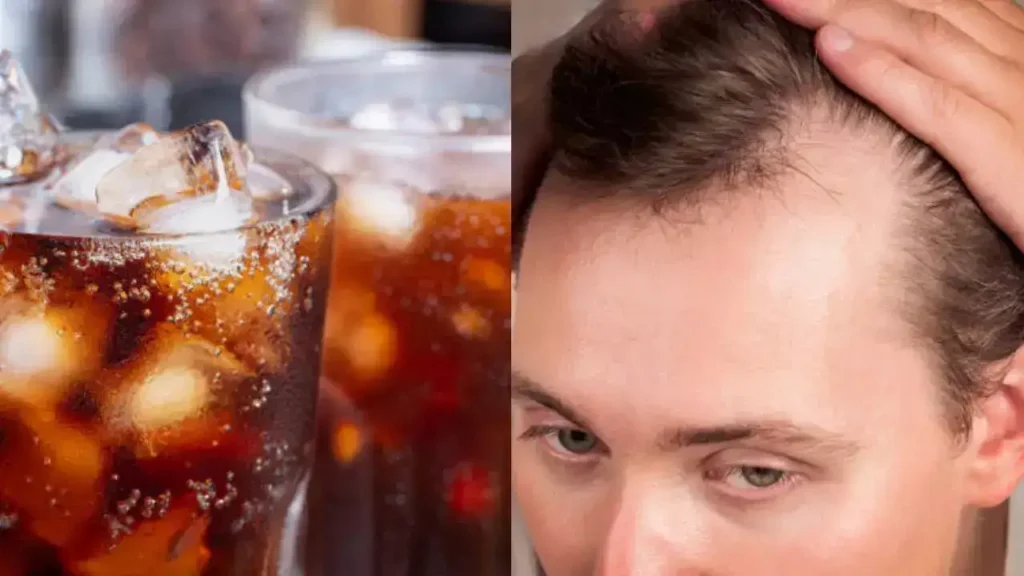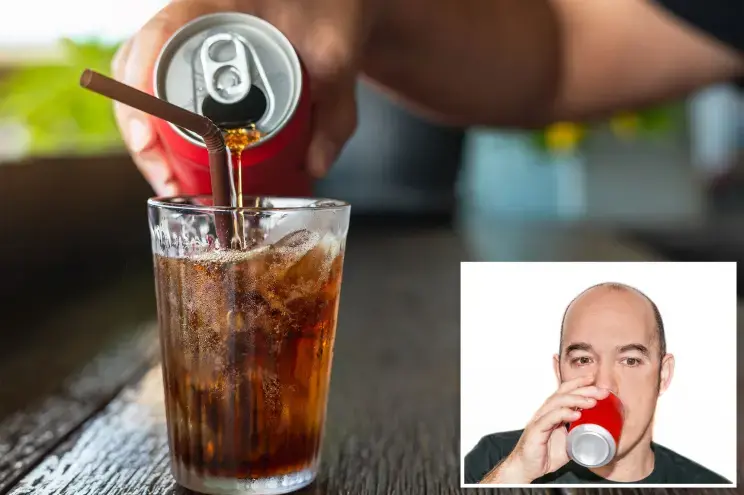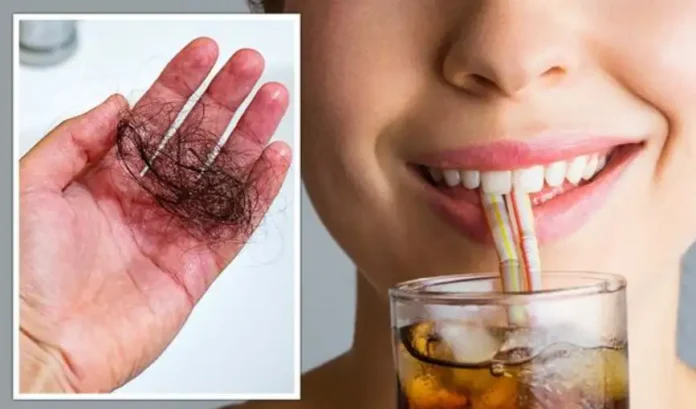Sugary drinks and hair loss are closely linked. Excess sugar triggers inflammation, hormonal imbalance, and nutrient depletion, weakening hair follicles and causing thinning. Limiting soda and sweetened beverages can reduce hair loss risk and improve scalp health, helping maintain stronger and healthier hair growth.
KumDi.com
Sugary drinks and hair loss may seem unrelated, but growing evidence shows a strong connection. Regular soda and sweetened beverage consumption can trigger inflammation, disrupt hormones, and deplete nutrients vital for hair growth. Understanding this hidden link is essential to protect your scalp and maintain healthier, fuller hair.
Hair loss is a growing concern for millions of men and women worldwide. While genetics, hormones, and aging are well-known contributors, a surprising lifestyle factor is now under the spotlight: sugary drinks. From sodas to energy drinks, these popular beverages may be quietly undermining your hair health.
In this article, we’ll explore how excessive consumption of sugary drinks can accelerate hair thinning, why it happens, and what you can do to protect your hair.
Table of Contents
How Sugary Drinks Affect the Body
Sugary beverages are loaded with refined sugars, artificial sweeteners, and additives that impact more than just your waistline. Regular consumption can spike blood sugar levels, trigger inflammation, and affect nutrient absorption. Over time, these effects can interfere with the delicate balance needed for healthy hair growth.
- Blood sugar spikes lead to hormonal fluctuations that may affect the hair growth cycle.
- Chronic inflammation can weaken hair follicles and increase shedding.
- Nutrient depletion occurs as sugary drinks often replace more nourishing options like water, milk, or natural juices.
These factors combined create an internal environment that is less supportive of strong, healthy hair.
The Link Between Sugary Drinks and Hair Loss
Increased Risk of Male Pattern Baldness
Men who consume high amounts of sugary drinks may be at greater risk of developing male pattern baldness earlier in life. Elevated sugar intake disrupts hormone regulation and may accelerate follicle miniaturization, the process where hair strands grow thinner and eventually stop growing.
Hair Thinning in Women
While women typically experience diffuse thinning rather than receding hairlines, sugary drinks can still contribute to weakened strands and reduced hair density. Hormonal imbalances, insulin resistance, and vitamin deficiencies—all aggravated by sugar—are common triggers for female hair loss.
Accelerated Aging of Hair Follicles
Excess sugar accelerates oxidative stress, which damages cells, including those responsible for hair growth. Over time, this oxidative stress shortens the active growth phase of the hair cycle, making strands fall out sooner.
Biological Mechanisms That Explain the Connection
1. Inflammation and Sebum Overproduction
Sugar stimulates overproduction of sebum, the natural oil on the scalp. Too much sebum clogs hair follicles, traps dirt, and creates an environment prone to irritation and microbial imbalance—all of which can weaken hair roots.
2. The Polyol Pathway
When sugar levels are consistently high, the body activates the polyol pathway, converting excess glucose into other compounds. This biochemical shift can stress hair follicle cells, reducing their ability to function optimally.
3. Nutrient Interference
High sugar intake can interfere with the absorption of key nutrients like zinc, vitamin D, and iron—all vital for healthy hair. Without adequate nutrition, follicles can shrink and produce weaker, thinner strands.
How Much Sugar Is Too Much?
Health experts recommend keeping added sugar intake below 25–30 grams per day for adults. Unfortunately, a single can of soda can contain nearly that amount or more. People who drink multiple sodas, energy drinks, or sweetened coffees daily may be consuming the equivalent of 10–12 teaspoons of sugar at once.
When these beverages are consumed regularly—say, several times a week—the cumulative effect can become a serious risk factor for hair loss.
Other Lifestyle Factors That Compound the Problem

Sugary drinks rarely exist in isolation. People who consume them frequently may also face other lifestyle risks that amplify hair loss, such as:
- Poor sleep from caffeine-rich soft drinks and energy beverages.
- High stress levels, which already accelerate shedding.
- Unbalanced diets where sugary drinks replace healthier hydration options.
- Excess alcohol consumption, often paired with sugary mixers, which further taxes the body.
Nutrients That Support Hair Growth
While limiting sugary drinks is a great first step, actively nourishing your hair with the right nutrients can make a huge difference:
- Protein: Hair is primarily made of keratin, a protein. Adequate protein intake strengthens hair structure.
- Iron: Deficiency can trigger thinning, especially in women.
- Vitamin D: Supports follicle cycling and helps maintain density.
- Zinc: Crucial for tissue growth and repair, including hair.
- Antioxidants: Found in fruits and vegetables, they fight oxidative stress caused by high sugar intake.
Healthy Alternatives to Sugary Drinks
If you’re worried about hair health but still crave flavor in your beverages, consider these alternatives:
- Infused water with lemon, cucumber, or berries.
- Green tea, which contains antioxidants that support hair follicles.
- Herbal teas like rooibos or chamomile, which hydrate without added sugar.
- Sparkling water with natural flavor as a satisfying replacement for soda.
Practical Steps to Protect Your Hair
- Limit sugary and carbonated drinks to occasional treats instead of daily habits.
- Replace one soda per day with water and gradually increase until sugary drinks are rare.
- Eat a nutrient-rich diet with leafy greens, lean proteins, and whole grains.
- Manage stress through exercise, meditation, or adequate rest.
- Get professional advice if hair loss persists—dermatologists and trichologists can help identify underlying causes.
Can Cutting Out Sugar Reverse Hair Loss?
While reducing sugar won’t necessarily regrow lost hair, it can slow down further loss and improve the quality of existing strands. Many people notice stronger, shinier, and thicker hair within months of switching to a lower-sugar lifestyle. Combined with proper nutrition and medical treatments where necessary, cutting out sugary drinks can be a powerful strategy to protect your hair.
Conclusion
Sugary drinks may seem harmless, but their hidden effects on hair health are becoming increasingly clear. By contributing to inflammation, hormonal imbalances, nutrient depletion, and oxidative stress, they create an environment where hair loss thrives.

FAQs
Can sugary drinks cause hair loss?
Yes, sugary drinks and hair loss are linked. High sugar intake can lead to inflammation, scalp oil imbalance, and poor nutrient absorption, all of which weaken hair follicles and accelerate thinning.
How do soda and sugary drinks affect baldness risk?
Soda and baldness are connected through excess sugar, which disrupts hormones like insulin and DHT, leading to faster follicle shrinkage and earlier onset of male pattern baldness.
Does cutting sugar help with thinning hair?
Reducing sugar can improve thinning hair by lowering inflammation, balancing hormones, and allowing nutrients like vitamin D and iron to better support healthy follicle function.
Which drinks are best to prevent hair loss?
To reduce drinks causing hair loss, replace soda with water, green tea, or herbal teas. These options hydrate, provide antioxidants, and support healthy hair growth naturally.
How much sugar is safe for hair health?
Limiting sugary drinks to below 25–30 grams of added sugar daily can lower hair loss risk. Staying hydrated with nutrient-rich beverages helps maintain strong, resilient hair.





